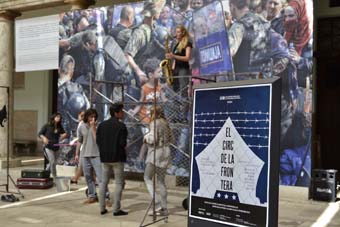
The theatre programme “Little Europes”, created by Escena Erasmus from Universitat de València and Àrea de Cultura de la Diputació de València has covered more than 1.858 kilometres in the Valencian region and has visited Ademuz, Villar del Arzobispo, Valencia, Riba-roja de Túria, Requena, Polinyà de Xúquer, Ontinyent, Quart de Poblet, Fontanars dels Alforins, Camporrobles, L’Eliana, Alzira, Alfarp, Ròtova, Llíria, Vallada, Emperador, Macastre and Gandia.
The fourth edition of the cultural programme “Little Europes” which began thanks to the European theatre project Escena Erasmus of Universitat de València (three vice-principals were involved: of Culture, Territorial Projection and International Relations) along with Área de Cultura de la Diputació de València finished this past Tuesday its tour around the Valencian region with great success and numerous audience participation. More than 5.300 people have seen the show.
“Little Europes” wants those from the Valencian region to enjoy cultural exchange among its residents and an European group of actor-students with an end of organising activities which take advantage of the valuable resources related to heritage and environment. The initiative promotes tourism and culture of the villages and cities which Erasmus students visit. All of the events end with a play which forms a part of the European theatre project. This year, the project focused on refugees and the play is titled “Border Circus”.
This year, the tour has covered 1.858 kilometres within the Valencia region and visited as many places as: Rincón de Ademuz (Ademuz), Serranía (Villar del Arzobispo), Camp de Túria (Riba-roja de Túria, L’Eliana y Llíria), l’Horta (Valencia, Emperador y Quart de Poblet) Utiel-Requena (Camporrobles y Requena), la Ribera Alta (Alzira y Alfarp), la Ribera Baixa (Polinyà de Xúquer), Vall d’Albaida (Ontinyent y Fontanars dels Alforins), Costera (Vallada), Safor (Gandia y Ròtova) and Hoya de Buñol (Macastre). All kinds of activities were carried out in these regions. They included meetings with associations, guided visits of places with historical heritage, photo-tours, gastronomic workshops, literary tours, folk dance workshops and European games for children.
Town halls which have welcomed the tour have given positive reviews to this programme and, according to the mayor of Vallada, María José Tortosa: “We wish to thank the committee and Universitat de València for making it possible for culture to come to the villages. Escena Erasmus has managed to engage the audience who is excited to share their cultural heritage and the social actions that it is involved in”. For Julio Biosca, the mayor of Fontanars dels Alforins “the fact that the show with such an artistic quality as Escena Erasmus offers, stops in such a small village as ours, is an opportunity which we can not ignore”. He added that “the chosen subject, of which our village is also quite aware, as well as the activities offered during the day, made the event a great success with numerous participation”.
The border circus
This year, under the title “El circ de la frontera” (“The border Circus”) a play which forms a part of Escena Erasmus project has portrayed the drama of refugees on the borders of Europe, but it also alludes to the forced migration processes which are happening all over the world. The play´s language is comical and draws on the circus in order to talk about the sad reality. Seven playwrights representing different generations and styles have participated in the preparation of this show: Manuel Molins, Maribel Bayona, Jacobo Pallarés, Guada Sáez, Mertxe Aguilar, Daniel Tormo and Anna Marí, who is the director of the show. Twelve actors and actresses of nine different nationalities acted in the play. Their countries of original are: Spain, Germany, Belgium, Greece, United Kingdom, Italy and Chile.
The tree of Europe is already growing in Macastre.
From among the social and cultural activities organised by “Little Europes” there was one that stood out: the planting of “the tree of Europe” near the Bolot fountain in Macastre, one of the regions which, four years ago, was affected by a fire that devastated thousands of hectares of land. The members of the theatre group planted an olive tree, together with the residents of the region. The olive tree, which in the words of the directors Anna Marí, Daniel Tormo and Josep Valero symbolizes “the great promise of Macastre and of ESCENA ERASMUS as the European project takes root and grows in the soil of values expressed by the “Little Europes” programme: “creating an Europe full of culture and respect towards the environment” .
For the mayor of Macastre, María José Casero: “Escena Erasmus has the courage not to be indifferent in the face of facts which require great commitment: ecological restoration after the environmental catastrophe and the reconstruction of the European project, broken at the borders by a lack of solidarity”.
Among those present at the symbolic act of planting the tree, there was the General Secretary of IVAJ, Jesús Martí, who evaluated the project as one of the “most interesting projects in the Valencian Community and in Europe” initiated by young people. Escena Erasmus won the third European Charlemagne Youth Prize of the European Parliament in the year 2011.
As the organizers of “Little Europe” report, preparation for the next edition, along with new elements and participation of the interested villages, is already in progress.
Last update: 22 de july de 2016 11:07.
News release


















